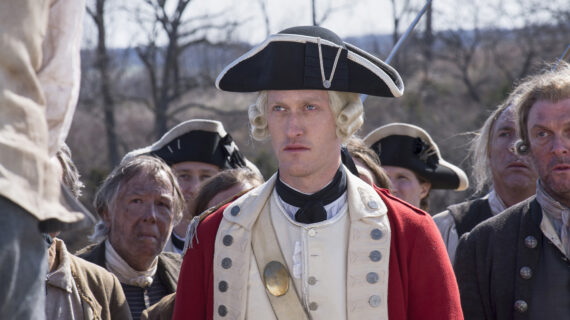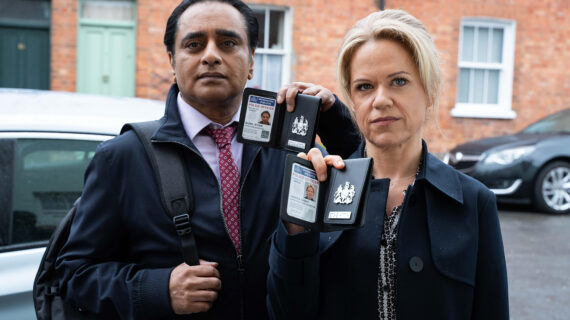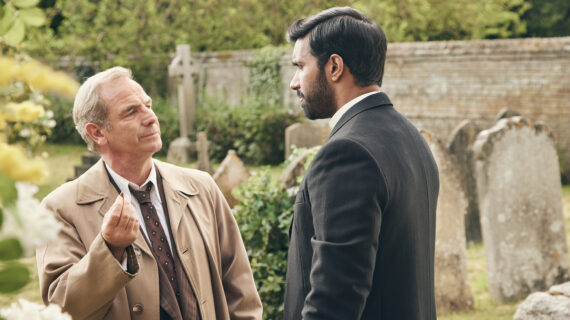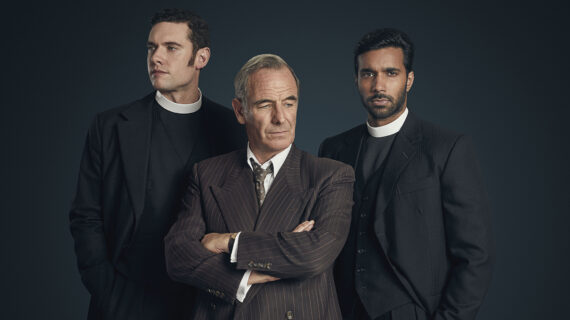Frederica Freyberg:
I’m Frederica Freyberg. Tonight on “Here and Now,” a first look at Governor Scott Walker’s re-election bid. A closer look at the state’s contract with Foxconn. Then, in our look ahead, we’ll discuss how Tuesday's elections around the country may have implications for Wisconsin's midterm races. And Shawn Johnson provides capitol insight on the state senate’s constitutional convention vote. It’s “Here and Now” for November 10.
Announcer:
Funding for “Here and Now” is provided, in part, by Friends of Wisconsin Public Television.
Frederica Freyberg:
After winning two general elections and one recall election for governor, surrounded by family and long-time supporters, Governor Scott Walker announced Sunday that he is officially in the race for re-election in 2018. His campaign kickoff was in Waukesha.
Scott Walker:
I'm pleased, I’m thrilled on behalf of our outstanding lieutenant governor, Rebecca Kleefisch and I, to announce today that Rebecca and I are asking for four more years to serve as your governor and lieutenant governor to move Wisconsin forward!
[cheers and applause]
Crowd:
Four more years! Four more years! Four more years! Four more years!
Scott Walker:
That's right. Four more years. Four more years to keep moving this state forward, looking ahead. We want a state where everyone shares. Everyone shares in our economic prosperity, whether you live in a big city or a small town, from one end of the state to the other. We want everyone to share in the Wisconsin comeback so that everyone can find not just a job, but a career to support themselves and their families going forward.
[cheers and applause]
Looking ahead, we want a state where every child, every child can have access to a great education. Whether it’s like Matt and Alex did at a traditional public school, a charter school, a choice school, a private school, a homeschool, a virtual school environment, wherever it might be. We trust parents to make the right decision for their sons and their daughters, not just for student success, because we want to energize the next generation of the 21st century workforce here in Wisconsin.
Frederica Freyberg:
As you just heard, Governor Walker’s re-election announcement touted education and the workforce, among other accomplishments like tax cuts. But he didn’t mention the state’s newly-minted $3 billion deal with Foxconn. We’ll have more on the week’s Foxconn developments later in the program, but we wondered why the governor left Wisconsin’s deal with the electronics giant out of his campaign remarks. Here’s what UW-Milwaukee political scientist Mordecai Lee says about that.
Mordecai Lee:
With Scott Walker, he’s such a good politician that there’s always a reason. It could be they’ve done some internal polling and they’ve found Republicans are mixed about it. In other words, some of them think this is the greatest thing since sliced bread. But it could be there are some libertarian Republicans who think, “I'm not sure this is a very good idea. This is corporate welfare. Or this is putting all your money on one instead of spreading your money around.” So it’s possible that he’s not sure that it’s a winner in terms of mobilizing his base. We know already that there are Democrats who are against it, but that might be more reflexive than anything else. And when it comes to this situation, he can boast about the potential of the contract, but by next November, nobody’s going to know if the potential worked or not. There can be beginning construction. They’re going to have a minimal crew. They’re going to have minimal employment. So it could be that if he wants to run on what he’s accomplished, past tense, that this contract is not the thing that fits into that box.
Frederica Freyberg:
Scott Walker’s re-election announcement this week comes in the same week other Republicans took a trouncing in elections in Virginia and elsewhere. In tonight’s look ahead, we ask our political panel were those elections a one-off or a trend, a referendum on President Donald Trump? Tonight Republican Bill McCoshen and Democrat Scot Ross are here. And thanks for being here.
Bill McCoshen, Scot Ross:
Thank you.
Frederica Freyberg:
First I wanted to ask you about Foxconn before we get to those questions. Is this a winner or a loser for Scott Walker?
Bill McCoshen:
Too soon to tell. I think they expected it to be an overwhelming winner. It hasn’t turned out to be, at least in the initial polls. Marquette University Law School did a poll in southeast Wisconsin just a couple weeks ago. It’s marginally popular, but people think it’s also a lot of taxpayer dollars that went into it. Outstate, it’s even less popular. So the challenge for the governor and his administration over the course of the next year will be to explain how this benefits the entire state.
Frederica Freyberg:
What do you think, winner or loser for the governor?
Scot Ross:
Oh, loser, and the reason you know is because he didn’t talk about in his announcement. I mean this is a career politician who does the political thing every single time. He knows this is a dog-out state because people out-state want to know why they’re spending $3 billion of tax money to give a bunch of jobs to people who are going to cross the Illinois border. So it’s going to be a real challenge for Governor Walker.
Frederica Freyberg:
And yet, if this promise of 13,000 jobs and all this spin-off employment, not to mention the $10 billion plant itself is kind of tantalizing for people, is bashing as Democrat candidate for governor Dana Wachs is doing ill-advised for that camp?
Scot Ross:
I think absolutely not because when it comes down to it, Scott Walker turned down a ton of jobs with high-speed rail and with the stimulus package he opposed. If that was a disqualifier, Scott Walker wouldn’t be governor right now. Elections are a snapshot in time. People kind of feel okay about the economy. So I think a bunch of jobs which may or may not come is not going to decide the governor’s race.
Bill McCoshen:
People want to see it. I mean the challenge so far is everything’s been ceremonial. There’s been this signing or that signing. There’s another one today down in Racine, the final signing — execution of the contract. The likelihood is this may not even be–the ground likely won’t be broken until late summer, early fall. It’s going to be hard for the governor to show what this is going to be, mean for the future because not much will have been done.
Frederica Freyberg:
Speaking of the governor and hitching his name to something or someone, what do you think this week’s election results in places like Virginia mean going forward? Was this a referendum of Donald Trump?
Scot Ross:
I think absolutely and I think it was a repudiation of it. I think what this showed was when you aspire to people’s base instincts, once in a while, like what happened in 2016 with Trump, you can catch what I would call “white lightning in a bottle” for his racist pandering. And in Virginia, hope won out. As a people, we’re pretty good people. We can transcend these sorts of divisive things. The problem for Scott Walker is now he’s either gotta go either all in for Trump which is so far what’s done or somehow back off and risk alienating the hardcore of his base. It is a real problem for Scott Walker.
Bill McCoshen:
Hard to say. This is 16 out of the last 17 elections, those two states are typically blue. They go against the party that’s in the White House so it trended with how they’ve generally done there. But I’ll say this, I think it’s a warning sign for Republicans because the energy was clearly bigger and higher on the Democratic side. Their turnout was extraordinary. I mean the candidates in Virginia, Ed Gillespie, got more, significantly more votes than the previous candidate, Ken Cuccinelli and still got trounced by nine points. So I think there is a lesson here. I don’t think it was about Donald Trump. I think it’s about Congress’s inaction and inability to get stuff done. If they do not get stuff done, I think Republicans could be in serious trouble in 2018.
Frederica Freyberg:
We asked both Wisconsin political parties, the GOP and the Dems, whether Donald Trump was good or bad for their brand and their candidates. Here’s what they said.
Mark Morgan:
When you look at the coalition that propelled President Trump to a win here in Wisconsin, that coalition, that winning coalition of Republicans in the southeast, small town rural voters, that’s a coalition that Governor Walker put together multiple times before then. So when I look at what a winning coalition is going to be, I think you see the president certainly maintains some favorability amongst those voters. I think those folks elected to see change in Washington. But beyond that what they voted for with President Trump, is they voted for that same type of bold leadership. They wanted change. They wanted to see results. That’s what Governor Walker has delivered and why they voted for him three times in a row.
Martha Laning:
I think it’s really important that the party is talking about what we stand for. That we want an economy that works for everyone, not just those at the top. That we want people who work hard and play by the rules to be able to get ahead. If you work full-time and you’ve put in your years, you should be able to retire with dignity. We believe in those things. But it’s also really important that we’re pointing out that what Donald Trump stands for, the divisiveness and the hate, is not acceptable either. What really makes America great is when we come together and when we work together to build thriving communities. That’s not what Donald Trump is about.
Frederica Freyberg:
What stands out to those comments to me is that neither one of them really want to talk that much about Donald Trump. I was interested to see that the Democratic party didn’t come out first on, you know, how bad they think Donald Trump is and the Republican party executive director also didn’t talk about Donald Trump as much as he talked about Scott Walker.
Scot Ross:
And I think the reason why for the Democrats at least, is because you’re not going to beat Scott Walker by proving he’ll make Wisconsin worse. You’re gonna beat Scott Walker by proving you can make Wisconsin better. Now we know Scott Walker has a ceiling. He’s never been on election day, higher than what? 52%. So he has that ceiling. Can Democrats engage their base to get out to these off-year elections? Now the last five–five of the last six national elections have been wave elections. Scott Walker’s benefited from a couple of those in terms of his turnout. In any campaign, you have four resources: time, treasure, technology and talent. Enthusiasm comes under talent. Right now the enthusiasm is with the Democrats. Is it going to remain? That’s the key. You’re not going to have that enthusiasm continue if you just bash the Republicans.
Bill McCoshen:
I don’t think it’s going to be about Trump. Truthfully, I think this could be a red wall for Republicans in 2018. I mean the Walker machine, I don’t know about the four Ts. I say mom, money, organization and message. Walker has significant advantages in all of those. Let’s start with the organization. He has built the best statewide organization ever on the Republican side, over the course of three elections. Remember he’s already been elected governor three times in the last 7.5 years. So that infrastructure is there. Arguably it helped elect Donald Trump, let him be the first Republican to win here since 1984. On the money side, Walker is the best fundraiser Republicans have ever had. So that won’t be an issue. On the message, what Walker does, he’s incredibly disciplined. He keeps his message tight. He talks about the promises made and the promises kept. He doesn’t go outside, out of his lane at all. I think that’s going to be tough for Democrats in 2018 to try and get him off message and find a wedge issue that will pierce through to voters.
Frederica Freyberg:
And yet the Democrats here in Wisconsin seem positively giddy with those results on the east coast and yet what do we know about their operation compared to what you were just talking about?
Bill McCoshen:
Having Tammy Baldwin on the top of the ticket, that should help, especially with the progressives. In many ways, this will be a base on base election. With her turning out the left, him turning out the right, who can get the middle? Walker’s been able to get the middle. He’s not Tommy Thompson. He doesn’t want to get 60% or 67%. He’s okay with 53%, which is his highest. That’s fine. His voters, they’re not apathetic. They’re rock solid for him. I don’t see — if I sense any apathy out there, it’s more on the Congressional level and those guys — if I'm them, I'm worried. You got to start getting things done in D.C. or there could be big trouble in the Congress and the U.S. Senate.
Scot Ross:
Well, I’d say first with the enthusiasm regarding Congress, Democrats have already marshaled credible challengers in almost every single Republican district here in the state of Wisconsin, including two that are now going to be targeted by the D.C.C.C. out in Washington D.C. But when it comes to Scott Walker, the thing is is he is very disciplined. But he is a divisive candidate. I don’t know if you’ve been on the internet. In Madison, for instance, my feed is nonstop divisive social media ads from Scott Walker. Stop the big labor bosses. Democrats are going to turn the state backwards. Those aren’t messages when you’re asking for an unprecedented third term the divisiveness is not going to work this time. It will get you 47% or 48%, but that last 4% is going to be whether or not Democrats can do this. We have 3.2 million people turn out in a presidential election year and about 2.3 to 2.4 and a non-presidential. If Dems can get that to 2.5, they’re going to win this election.
Frederica Freyberg:
I was going to ask, how important is turnout in 2018?
Bill McCoshen:
Huge. Every time. Particularly in a base on base election. You got to get your people out. The one thing I would say is if it’s 47% or 48%, the thing that will tip them over, voters vote their pocketbook first. We’ve talked about that here on this segment in the past. The economy’s going to be, looks like it will be gangbusters in 2018.
Frederica Freyberg:
Right.
Frederica Freyberg:
So that will play to Walker’s advantage. No question about that.
Scot Ross:
I would just say that the pocketbook issue for people here in the state of Wisconsin are jobs, yes. Wages. Our wages are terrible here. Education, health care, student loan debt. All those things that Scott Walker has done the opposite of what’s going to help the middle class here. A lot of people around the state of Wisconsin who might be unemployed like the 126 people who are losing their jobs in Fond du Lac, for instance, are going to say, “Where’s my job, Scott Walker, when you’re giving a bunch of Illinois workers jobs we’re paying for.”
Frederica Freyberg:
What about the wages issue and maybe the split between southeast Wisconsin and northern Wisconsin?
Bill McCoshen:
If Foxconn comes through as they’re promised to do, with 23,000 jobs, 10,000 direct, 13,000 indirect, it’s going to put pressure on wages all over the state. That’s going to benefit every worker from Kenosha to Superior, my hometown and from Green Bay down to Platteville.
Frederica Freyberg:
As we’ve discussed though, that's not going to be in time for next year’s election.
Bill McCoshen:
It won’t be. But there’s a shortage out there right now. Workers — companies all across– are looking for workers every single day and are having trouble filling those positions. So the more that exists, that phenomena exists, the more wages will go up.
Frederica Freyberg:
We were talking about turnout and kind of the split in Wisconsin and we’ve discussed before this kind of politics of resentment between people maybe in the northern reaches or elsewhere. Those people came out for Donald Trump. And it looks like in Virginia in particular, some of those same people may have come out for the Dems this time. Do you see that happening?
Scot Ross:
I think a lot of stuff — I think a lot of what happened in rural Wisconsin in 2016 was that there weren’t Democrat messages being communicated out there. We had eight years of President Obama. In Ron Kind’s district, he didn’t have a race. So there weren’t TV ads defending what was going on, the good things that were going on in Washington D.C. under the Obama Administration. That was absent. I think the Democrats have a real opportunity. I think the resources will be there. Never going to be able to out-spend the Republicans. You just need enough to win on election day.
Bill McCoshen:
There was some evidence that Trump moved union households over to his ticket in 2016. Walker isn’t going to get those guys, he’s just not, in the state of Wisconsin. So do they stay home? Are they fired up enough to come out and vote for his opponent? It’s all going to come down to what that opponent’s message is against Scott Walker.
Frederica Freyberg:
All right. We leave it there. Thank you very much.
Scot Ross, Bill McCoshen:
Thank you.
Frederica Freyberg:
Now tonight’s closer look segment and the latest on the Foxconn deal.
Scott Walker:
We are so excited to have Foxconn here with its $10 billion investment, leading to 13,000 good-paying, family-supporting jobs right here in the state of Wisconsin.
[cheers and applause]
Frederica Freyberg:
Governor Scott Walker and the flat screen company chairman Terry Gou signed the 29-page contract this afternoon in Racine. U.S. House Speaker Paul Ryan was also there. The contract includes language that in the next five years, the state could get 100% of the tax credits back if the company moves the plant or closes it. Thereafter, Foxconn's parent company and Terry Gou himself guarantee $500 million in the event the Wisconsin operation fails to meet jobs goals. The claw backs sunset after 15 years. The Wisconsin Economic Development Corporation worked to get the guarantee and once in hand, the WEDC board voted 8-2 to approve the contract.
Mark Hogan:
This is an exciting day for the state of Wisconsin. As I've said a few times, what our goal in this whole transaction, it started 28 weeks ago on Friday, has been to provide the company the kind of flexibility and latitude that they need to invest up to $10 billion, create 13,000 jobs here in the state of Wisconsin. And at the same time create certainty around the protection for the taxpayers.
Frederica Freyberg:
Two democrats on the board voted against the contract, including Representative Dana Wachs of Eau Claire.
Dana Wachs:
I voted no. My rationale is that $3 billion spent on one company within one industry is a, is a risk that I think is too much for our taxpayers.
Frederica Freyberg:
Now to the state legislature and tonight’s capitol insight. Sponsors of a Senate measure to approve a constitutional convention say its passage this week makes Wisconsin the 28th state to approve such a resolution. If 34 states approve, convention delegates can be called to draft amendments to the U.S. Constitution. Republican proponents of the convention say they would focus on an amendment to require a balanced federal budget. But what else could be possible? We turned to Wisconsin Public Radio’s Capitol Bureau Chief Shawn Johnson. Thanks for being here.
Shawn Johnson:
Hey, Fred.
Frederica Freyberg:
In your reporting, you referred to this as an Article 5 resolution. What is Article 5?
Shawn Johnson:
It refers to Article 5 of the U.S. Constitution, which is a fairly short passage that talks about how you can amend the Constitution. And the way that this country has done it for the previous 27 amendments is a different process. We have a two-thirds vote in the U.S. House, two-thirds vote in the U.S. Senate and then ratification by three-quarters of the state legislatures. This would be a completely different process. What we’re talking about here and what passed the Wisconsin Senate this past week, this would be a so-called convention of states. Where if two-thirds of states agree, they can petition Congress to form this Article 5 convention and then they can propose pretty much whatever they want.
Frederica Freyberg:
So after 230 years, the Wisconsin legislature believes the time is now to push for this Article 5 resolution and this balanced budget amendment?
Shawn Johnson:
It really has been, you know, that long. Going back to 1787, this hasn’t been used. So it would be a — you know, an extremely big deal, an historic process. And when you listen to supporters of this, they say they don’t take it lightly and that if you look back at the great civilizations, the thing that has always toppled them has been debt. And they feel like debt is growing too large in the United States right now. And that it’s a national security threat it’s so bad.
Frederica Freyberg:
Well, let’s take a listen to what one of the Republican backers, Senator Dave Craig, had to say about this on the Senate floor.
Shawn Johnson:
Article 5 was put in place specifically for the situation in which Congress, the federal government, needs assistance from the states, by which under our Constitution, the federal government derives its power. To somehow say on this body’s floor that this is not within our purview is ridiculous.
Frederica Freyberg:
But what are the rules about whether just one amendment like this could be added?
Shawn Johnson:
That's the thing. There are no restrictions like that in the Constitution. So if this convention is called, even though the states have said we’re calling it to talk about this balanced budget amendment and a number of — Wisconsin passed a resolution spelling out what the convention would be about. They passed a bill that said here’s who would be our delegates. Once the convention is called, constitutional experts say there’s nothing that restricts what delegates can do. And so they could consider amendments on any number of issues, including two existing protections that are in the U.S. Constitution.
Frederica Freyberg:
Understood why people might consider that a slippery slope.
Shawn Johnson:
Yeah. And that was the argument that you heard from opponents of this, which in this case were the Democratic members of the State Senate. Democratic Senator Kathleen Vinehout was among those who said, “If you call this convention, you’re opening up all these protections that people hold dear.” Here is Senator Kathleen Vinehout.
Kathleen Vinehout:
As rewriters of the United States Constitution, the delegates become the sovereign power in the land. More powerful than the United States Congress, more powerful than the United States Supreme Court, more powerful than the United States President.
Frederica Freyberg:
So we should note that Kathleen Vinehout is one of the Democrats running for governor. But now how do sponsors of this reconcile the idea that the tax plan in Washington is kind of on the fast track and the CBO says that this would add $1.7 trillion to the deficit? How do reductions in revenue square with potential needs for government spending? I know opponents of the balanced budget amendment have some concerns along these lines. Like what?
Shawn Johnson:
Yeah. I mean, if you sort of set aside the concerns laid out there by Senator Vinehout and others that this could open a Pandora's box and that you could have any amendment to the Constitution, set that aside. Let’s say that they just focus on a balanced budget amendment. What does that mean, you know? What is a balanced budget amendment? If you’re talking about not letting the government spend more than it takes in, that would reduce debt, but it would be a dramatic departure from the way government as we know it operates now. What does that mean if you have a big tax cut bill? What does that mean if you have a war? What does it mean if you have a natural disaster like a hurricane and suddenly you need more money than you have to pay for it? These are all questions that are, you know, raised by the prospect of a balanced budget amendment, you know, especially since you don’t know what that would look like. It would be up to delegates.
Frederica Freyberg:
Now, as we discussed in the lead to this segment, 34 states would have to pass this resolution. How likely is this to happen?
Shawn Johnson:
We don’t know. You know, there’s really no way to say. I think as more and more states get added to the list, you start to realize, hey, they’re getting kind of close to that number. 28 is probably–looks pretty high to people who started this push years ago. And so yeah, you’re six states away at this point. A little caveat there. If they were to get up to that 34 threshold, there would be some debate over whether or not they’d hit that number. Because some of these resolutions were passed decades ago. And so there would be some dispute, there is some dispute over whether or not those are still valid. Some of them are calling for slightly different language than others. And so when would you hit that number? That would be debated even if they hit that 34 according to sponsors.
Frederica Freyberg:
All right. Well, thanks for spelling this out for us. Shawn Johnson.
Shawn Johnson:
You're welcome.
Frederica Freyberg:
The UW Board of Regents Thursday voted to approve the reorganization of the university. While two regents voted no, including the former state auditor who called for more time to study the plan, the merging of the systems two-year schools with four-year campuses moves ahead. Wisconsin Public Television, now part of UW-Extension, would move to UW System administration. System President Ray Cross says declining enrollment at two-year schools puts them in jeopardy and says he believes the time is now to make the changes even though the details have not been worked out.
Ray Cross:
My dream for the University of Wisconsin System and for the state of Wisconsin includes a future where the people of Wisconsin, regardless of their past experiences or financial circumstances, have an opportunity to earn a college degree. That means maintaining and even expanding access to the university, assuring affordability, continuing to simplify and streamline transferability, providing enhanced advising so that we can grow the number of college graduates this state so desperately needs.
Frederica Freyberg:
The changes are expected to take effect July 1, 2018. And that’s our program for tonight. I’m Frederica Freyberg. Have a great weekend.
Announcer:
Funding for “Here and Now” is provided, in part, by Friends of Wisconsin Public Television.
Search Episodes
Related Stories from PBS Wisconsin's Blog

Donate to sign up. Activate and sign in to Passport. It's that easy to help PBS Wisconsin serve your community through media that educates, inspires, and entertains.
Make your membership gift today
Only for new users: Activate Passport using your code or email address
Already a member?
Look up my account
Need some help? Go to FAQ or visit PBS Passport Help
Need help accessing PBS Wisconsin anywhere?

Online Access | Platform & Device Access | Cable or Satellite Access | Over-The-Air Access
Visit Access Guide
Need help accessing PBS Wisconsin anywhere?

Visit Our
Live TV Access Guide
Online AccessPlatform & Device Access
Cable or Satellite Access
Over-The-Air Access
Visit Access Guide
 Passport
Passport

















Follow Us